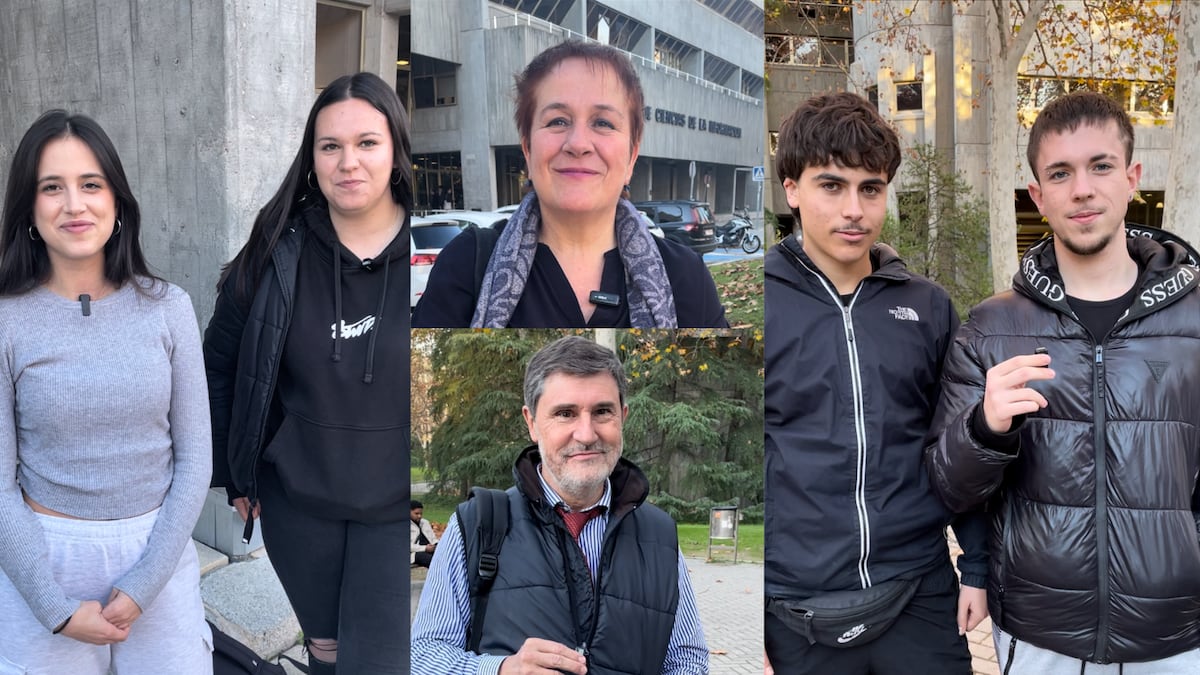“Since using it, I think less for myself and I try a lot less. I have something to do and I’m going to ask ChatGPT, I don’t even try to understand it,” confesses Sofía, a student who is studying the first years of the Journalism Degree at the Complutense University of Madrid. Like her, many students use the OpenAI tool in their courses, which turned two years old a few days ago. Its widespread use among students, and sometimes without control, greatly worries and frustrates a part of the teaching staff. With self-taught training in the use of ChatGPT, Sofía assures that it has helped her pass assignments and subjects in the last two years, although “in general, she has not learned much.” A walk through the Madrid university collecting impressions demonstrates the extent to which the use of artificial intelligence (AI) has become normalized in classrooms.
Nicolás is a History student who also uses ChatGPT to advance his studies. He found out about the tool through classmates, but he didn’t start using it until some time later. “I wanted to resist because at first I didn’t trust it, and then I saw how useful it was and that it was quite reliable,” he says. Since then, he has used it to search for sources and bibliography “almost the same times” as the Google search engine. “For me, it beats Wikipedia, it’s easier to use and you end up finding things that searching on your own, either due to lack of information or training, you wouldn’t end up finding,” he comments.
@elpais “Since using it, I think less for myself and I try a lot less. I have something to do and I’m going to ask Chat GPT, I don’t even try to understand it,” confesses Sofía, a student who is studying the first years of the Journalism Degree. Like her, many students use the OPEN AI tool in their courses, which turned two years ago a few days ago. Its widespread use among students, and sometimes without control, greatly worries and frustrates some teachers. Professors and students recount the use of Chat GPT during these two years at the university 📹️ Jorge Hernández de la Mata #chatgpt #universidad #españa #profesores #alumnos #CapCut
♬ original sound – El País
Jorge is another Journalism student who also uses AI, although only to start work. “I use it for the fear of the first blank paragraph, it helps you, it gives you a support point to start spinning your ideas on your own,” he describes. Christian, who is in the same grade, claims to use it the same way. “It may not be valid for doing an entire job, but it is for that first idea of the job,” he comments. They also agree that they do not consider ChatGPT as a source of learning.
Professors for and against
Along those lines is Soledad Segoviano, professor of International Relations at the Complutense University. Despite the growing popularity of ChatGPT, Segoviano learned about it after a talk at his college. “A trader who came to give a talk started talking about AI. He asked them, ‘guys be honest: how many people use ChatGPT?’ The entire room raised their hands. “I was shocked.” Segoviano follows the trend of skepticism among teachers about the tool: “It facilitates plagiarism and little effort. In the long run, it neutralizes creativity,” he says, while confessing to having changed the way students are asked for work. “You don’t even know how to ask the questions anymore, it seems like a fraud to me,” he states bluntly.
Not all teachers are against it. This is the case of Pedro Alonso, professor of Information Business, who relativizes the use of AI among students: “If you use it well, you can go twice as fast. If you are paying for a degree, to take a subject and have a teacher attend to you, and you are doing your work with ChatGPT, you are wasting your time.” Furthermore, he is in favor of changing other aspects rather than banning these tools. “This is not about setting up an official regime to go against ChatGPT, not even as a joke. It’s about instilling principles in students, about wanting to do things that improve them on their own,” he argues.
There are even some teachers who use AI to teach. Gabriel Rodríguez is a teacher of Professional Programming Training in Seville and says that it helps him plan his classes. “I have what I’m going to give each day timed on a calendar, so I ask ChatGPT ‘is there anything else I need to give?’ and it reminds me of something that has passed me by,” he explains.
He also teaches with AI from the second course onwards, because in the first course he prohibits the use of ChatGPT. “First I need the student to learn to think about how to do things. And in the second course, which will take place in six months, I want you to learn how to produce and enhance your performance with AI.” He is in favor of using the tool in education, but after motivating students to think before “using AI effortlessly.” And he gives an example: “I have already made my algorithm. Now I want to ask ChatGPT how can I improve it. And now, depending on the answer they give you, question it, ask them to explain it to you in a better way or explain what mistakes you may have made.”
Part of the students, aware
There are already part of the students who take the advice of teachers and experts in the field to use AI sensibly. Valentina is doing a PhD and also uses ChatGPT. “It needs conscious use,” he says. “It helped me achieve my objectives by asking questions and answers, and with what I obtained I could reflect, and at the same time ask again and build knowledge through that information,” he says about it.
Nadia is doing a Master’s Degree in Civil Engineering. He assures that he uses AI to correct and organize his writing: “It has made my way of studying more efficient. I used to spend a lot of time searching websites for information, and ChatGPT makes it easy for you.” She assures that the tool has made her see that “she is seasoned” to be able to use it because “it has gone through that process of searching for sources by itself.” He also gives private classes to four-year-old children, and warns of the danger of the tool: “By giving it all to you ‘chewed’, it may not awaken your curiosity in looking for things.”
Jorge and Christian, journalism students, are also aware that ChatGPT is a double-edged sword. “In the short term it does things for you in a moment, but you will achieve academic objectives better if you do them for yourself,” says Christian. “What helps is to do the whole process, make an effort to understand it yourself and also use ChatGPT for it,” Jorge says.









